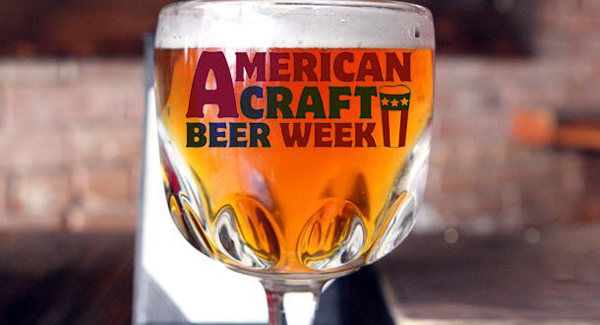當前位置: Language Tips> 新聞播報
分享到
我愛喝青島啤酒,嘗試過雪花啤酒,也常喝北京產的冰鎮燕京啤酒。但我最喜歡的還是桶裝精釀啤酒,味道醇香誘人。有人預測,中國很快會迎來精釀啤酒的大繁榮。隨著中國人越來越富裕,中產階級的規模也越來越大,人們的口味也會發生變化。也許是時候重新思考那些有利于啤酒業巨頭而削弱本土釀酒企業的政策了。

By Greg Fountain
In case this column doesn't make it immediately obvious, I might as well come right out and say it - I like beer.
如果這篇專欄還寫得不夠明顯的話,我可以直截了當地說:我喜歡啤酒。
I'm partial to a Tsingtao, have experimented with Snow and can often be found supping from a cold can of Beijing's own Yanjing.
我愛喝青島啤酒,嘗試過雪花啤酒,也常喝北京產的冰鎮燕京啤酒。
But what I enjoy most is a nice, rounded craft beer - something with depth, flavor and tantalizing taste.
但我最喜歡的還是桶裝精釀啤酒,味道醇香誘人。
In Yorkshire, we call such beverages "hand pull", because they're most often served by way of a beer engine - a manually operated device for pumping up the lustrous liquid from a cask in the pub's cellar.
在約克郡,人們稱這種酒為“手泵式啤酒”,原因是服務員在酒吧地窖取酒時,一般都是用一種手動操作的裝置把這些色澤光亮的液體從桶里壓出來。
Strictly speaking, this would more correctly be termed cask-conditioned beer or "real ale", which similar to the United States-style craft beer that China is more familiar with, owes much of its popularity to a backlash against mass-produced lagers that began in the 1970s.
嚴格來說,“手泵式啤酒”更應該叫做桶裝啤酒或“散裝鮮啤酒”,類似于中國人較為熟悉的美式精釀啤酒。精釀啤酒興起于20世紀70年代,主要是因為當時人們開始反對工業化生產貯藏啤酒。
Between 1978 and 2012, the number of breweries in the US rose from 42 to more than 2,750, with virtually all of that growth attributable to craft brewers. Over the same period, the number of "real ale" brewers in the UK rose to more than 700, four times what it had been in 1971.
1978年至2012年期間,美國啤酒廠的數量從42家增加至2750多家,其中增加的幾乎都是精釀酒廠。同一時期,英國“散裝鮮啤酒”釀造商的數量增加至700多家,是1971年數量的四倍。
According to trade group the Brewers Association, the US craft beer market was worth $23.5 billion last year.
據美國啤酒釀造商協會統計,去年美國精釀啤酒銷售額為235億美元。
Some predict that a similar craft beer explosion will soon hit China, which is why I read a recent Fortune article on the subject with great interest.
有人預測,中國很快會迎來精釀啤酒的大繁榮,這也是為什么我會津津有味地讀完了近期《財富》雜志上的一篇相關文章。
That piece, titled "China's New Craft-Beer Bully" outlined global beer behemoth Anheuser-Busch InBev's attempts to muscle in on the Chinese market at the expense of local players.
這篇名為《中國精釀啤酒的新“惡霸”》的文章概述了全球啤酒行業巨頭百威英博啤酒集團是如何試圖擠掉中國本土品牌,搶占中國市場的。
Apparently, the "heart of its strategy" is to "squash-or someday soon acquire-small breweries before they have a chance to capture market share". It does so by undercutting smaller operations, leveraging its size and ability to throw money around.
很明顯,百威英博的戰略核心是:百威英博通過壓低小型釀酒商的利潤空間,以其規模和實力四處投資,在小型釀酒商有機會獲得市場份額之前,擠壓其生存空間--或者將其吞并。
The reason why is simple - it doesn't want to miss the craft revolution, like it did in the US.
這么做的原因很簡單——在錯失美國的精釀革命之后,百威英博不想在中國重蹈覆轍。
By offering eye-watering sums of cash, big brewers like AB InBev can induce bars to remove all competing brands from their taps. Not all outlets will do so, but many - as the Fortune article points out - struggle to turn down the kind of money that's on offer.
像百威英博這樣的大型釀酒商可以用豐厚的現金來誘惑酒吧,將在售的精釀啤酒全部轉換為該公司旗下品牌。《財富》的這篇文章指出,雖然有的經銷店不買賬,但還是有很多經不起這種誘惑。
China's current regulatory environment also favors these big foreign companies - in the US, brewers can't monopolize the beer a bar offers or control distributors, but there are no such restrictions here.
中國目前薄弱的監管環境也有利于這些大型外國公司。在美國,釀酒商不能壟斷酒吧銷售的啤酒或控制經銷商,但在中國沒有這樣的限制。
Rules around product safety, meanwhile, prevent many local craft brewers from running in-China bottling operations, which again puts them at a disadvantage.
與此同時,中國監管法規對啤酒飲用安全的要求讓許多本土精釀制造商無法開展瓶裝啤酒業務,進一步讓他們處于劣勢。
At present, craft beer only accounts for a tiny fraction of China's estimated $80 billion-per-year beer market.
中國當前啤酒市場市值約為每年800億美元,而精釀啤酒只占了其中一小部分。
But as the country gets ever wealthier and the size of its middle class increases, tastes will change. Perhaps it's high time to rethink policies that favor the big beer bullies over homegrown entrepreneurs?
但是,中國人正越來越富裕,中產階級的規模也越來越大,人們的口味也會發生變化。也許是時候重新思考那些有利于啤酒業巨頭而削弱本土釀酒企業的政策了。
英文來源:“CHINA DAILY”微信公眾號
翻譯:劉晨菲
編審:丹妮 董靜
音頻編輯:焦潔
更多內容請關注“CHINA DAILY”微信公眾號:

Broadcaster

Greg Fountain is a copy editor and occasional presenter for China Daily. Before moving to Beijing in January, 2016 he worked for newspapers in the Middle East and UK. He has an M.A in Print Journalism from the University of Sheffield, a B.A in English and History from the University of Reading.
上一篇 : 老外在中國:我的面子碎一地
下一篇 :
分享到
關注和訂閱

電話:8610-84883645
傳真:8610-84883500
Email: languagetips@chinadaily.com.cn